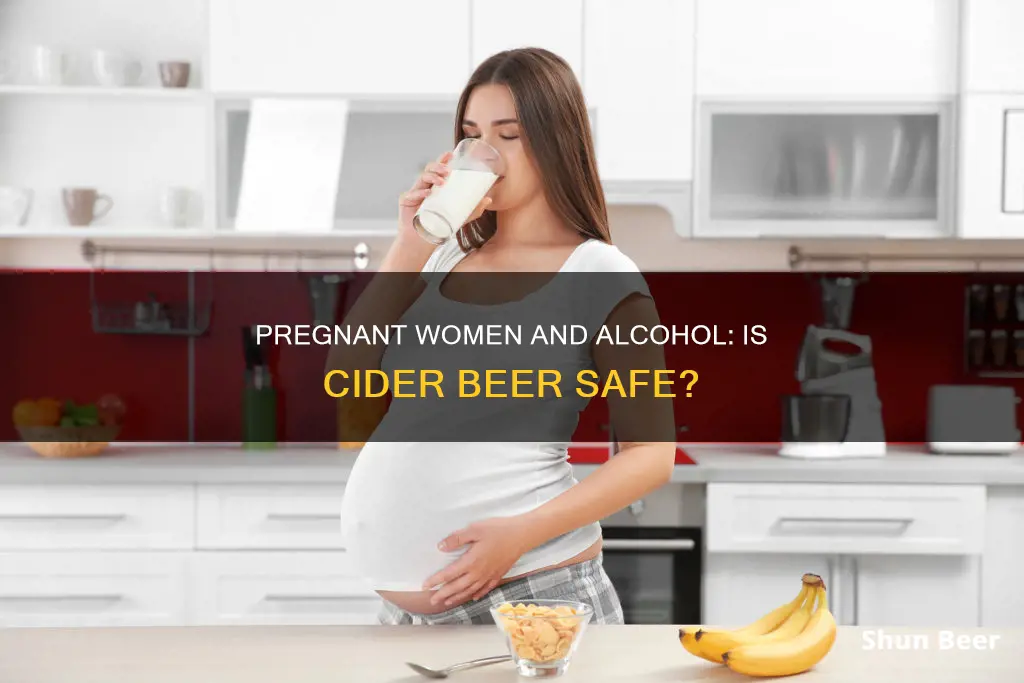
Drinking alcohol during pregnancy can lead to long-term harm to the baby, increasing the risk of miscarriage, premature birth, low birth weight, and a serious lifelong condition called fetal alcohol spectrum disorder (FASD). As such, it is recommended that pregnant people or those planning to become pregnant should not consume alcohol. While non-alcoholic beverages are a good alternative, it is important to note that they can still contain trace amounts of alcohol, typically less than 0.5%. The decision to consume non-alcoholic drinks during pregnancy is a personal choice, and individuals are advised to read labels, consult with healthcare providers, and opt for alcohol-free options with 0.0% ABV to avoid any risks associated with alcohol consumption during pregnancy.
What You'll Learn

Is non-alcoholic cider beer safe for pregnant women?
Drinking alcohol while pregnant is not recommended, as it can lead to long-term harm to the baby. Alcohol can pass from the mother's blood through the placenta to the baby and affect its development. The baby's liver is not fully developed and cannot process alcohol. Drinking alcohol during pregnancy can increase the risk of miscarriage, premature birth, low birth weight, and fetal alcohol spectrum disorder (FASD).
With that being said, let's address the question of whether non-alcoholic cider beer is safe for pregnant women. Non-alcoholic drinks, by law, can contain up to 0.5% alcohol. While this may seem like a negligible amount, it is important to note that there is limited research on the safety of consuming such beverages during pregnancy. The American College of Obstetrics and Gynecology (ACOG) states that no amount of alcohol during pregnancy is considered safe due to the risks associated with it.
Some sources suggest that non-alcoholic cider beer is safe for pregnant women, as the trace amounts of alcohol are similar to what may be found in some fruits and juices. However, it is always recommended to consult with a doctor before consuming any amount of alcohol during pregnancy.
To completely eliminate the risks associated with alcohol consumption during pregnancy, it is advisable to choose drinks labeled "alcohol-free" instead of "non-alcoholic," as the former must legally contain no traceable alcohol.
Beer and Medication: A Safe Combination?
You may want to see also

What are the risks of drinking cider beer while pregnant?
Drinking alcohol during pregnancy is not recommended, as it can cause long-term harm to the baby. This includes drinking cider beer, even in small amounts. The more you drink, the greater the risk to the baby.
When a pregnant woman drinks, alcohol passes from the blood through the placenta to the baby and can seriously affect its development. The baby's liver is not fully developed and cannot process alcohol.
Drinking alcohol during pregnancy increases the risk of miscarriage, premature birth, and low birth weight. It can also affect the baby after birth and cause fetal alcohol spectrum disorder (FASD). FASD can cause problems with learning, behaviour, joints, bones, muscles, organs, managing emotions, developing social skills, hyperactivity, and impulse control.
While non-alcoholic cider beers are becoming a popular option for pregnant women, they still contain trace amounts of alcohol, up to 0.5% alcohol by volume. There is limited research on the effects of non-alcoholic drinks during pregnancy, and no evidence suggests that they are harmful or safe. However, the American College of Obstetrics and Gynecology (ACOG) states that no amount of alcohol during pregnancy is considered safe.
Some research suggests that light drinking during early pregnancy may not have negative effects, but there are no guidelines on how much alcohol is safe. As a result, experts recommend that pregnant women abstain from drinking any alcohol, including non-alcoholic beverages, to eliminate any risk of fetal alcohol spectrum disorder.
It is important to note that some non-alcoholic drinks may contain higher ethanol levels than indicated on their labels. A 2010 study found that 29% of the beverages claiming to have no or low alcohol content had higher ethanol levels than declared. Therefore, pregnant women should always read labels carefully and consult their healthcare provider before consuming any non-alcoholic drinks.
Head Injuries and Alcohol: What You Should Know
You may want to see also

What are the alternatives to cider beer for pregnant women?
While some sources claim that non-alcoholic beer is safe for pregnant women to consume, others advise against it. This is because non-alcoholic beer can contain up to 0.5% alcohol, and there is limited research on the effects of this on fetal development. The American College of Obstetrics and Gynecology (ACOG) says that no amount of alcohol during pregnancy is considered safe.
If you're looking for an alternative to cider beer, there are plenty of other non-alcoholic drinks that are safe for pregnant women. These include:
- Mocktails: You can make your own mocktails at home by mixing fruit juices, soda water, and herbs. Some popular mocktail recipes include alcohol-free mimosas, lemon lavender martinis, and cucumber gimlets.
- Non-alcoholic wines: There are several non-alcoholic wines available on the market that taste similar to their alcoholic counterparts. Just be sure to check the label, as some of these may contain up to 0.5% alcohol.
- Non-alcoholic spirits: Like non-alcoholic wines, there are now several non-alcoholic spirits on the market that mimic the taste of their alcoholic counterparts. Again, check the label to ensure they are alcohol-free.
- Non-alcoholic cocktails: There are also non-alcoholic cocktail options available, such as the Free AF Apero Spritz, which mimics the taste of an Italian aperitif.
- Soft drinks: If you're looking for a simpler option, you can try soda water with a splash of pineapple juice, lemonade with soda water, or a mix of cranberry juice and ginger ale.
Beer Chillers: How Do They Work?
You may want to see also

What happens if a pregnant woman drinks cider beer?
Drinking alcohol during pregnancy can have serious consequences for the baby's development and health. Alcohol passes through the placenta to the baby, who is unable to process it due to their underdeveloped liver. This can lead to an increased risk of miscarriage, premature birth, and low birth weight. It can also cause long-term harm, such as fetal alcohol spectrum disorder (FASD), which can result in problems with learning, behaviour, joints, bones, muscles, organs, managing emotions, and developing social skills.
Non-alcoholic drinks, including beer, can still contain up to 0.5% alcohol by volume, and there is limited research on their effects during pregnancy. While some suggest that light drinking during early pregnancy may not have negative effects, there are no clear guidelines on how much alcohol is safe, and most experts advise against any alcohol consumption during pregnancy.
The American College of Obstetrics and Gynecology (ACOG), the Centers for Disease Control and Prevention (CDC), and the American Academy of Pediatrics (AAP) recommend that no alcohol, including "non-alcoholic" drinks, should be consumed during pregnancy. This is because there is a chance of consuming more alcohol than expected, as labels may not always be accurate, and some drinks may contain unsafe ingredients.
However, consuming non-alcoholic drinks during pregnancy is ultimately a personal choice, and some people may find them helpful in quitting alcohol while pregnant. It is important to read labels, be aware of potential risks, and consult a healthcare provider for personalized advice.
Beer Advocate: How Does It Work?
You may want to see also

What are the recommendations for pregnant women regarding drinking cider beer?
Drinking alcohol during pregnancy is strongly discouraged by medical professionals, as it can cause serious harm to the baby, including long-term complications. The more alcohol consumed, the greater the risk to the baby. Alcohol can pass through the placenta to the baby, affecting their development, as they are unable to process it due to their underdeveloped liver.
Drinking alcohol during pregnancy can increase the risk of miscarriage, premature birth, and low birth weight. It can also cause the baby to develop fetal alcohol spectrum disorder (FASD), which can lead to problems with learning, behaviour, joints, bones, muscles, organs, emotions, social skills, hyperactivity, and communication.
To minimise any risk to the baby, it is recommended that pregnant women abstain from consuming alcohol, including cider beer. This is because even drinks labelled as "non-alcoholic" can contain up to 0.5% alcohol by volume, and there is limited research on the effects of such drinks on fetal development. While some research suggests that light drinking during early pregnancy may not have negative effects, there are no clear guidelines on how much alcohol is safe, and most experts advise against any alcohol consumption during pregnancy.
Some non-alcoholic beverages may also contain herbs or other ingredients that are not considered safe for pregnant women. Therefore, it is essential for pregnant women to carefully read labels, check with their healthcare provider, and make an informed choice about consuming non-alcoholic drinks.
Shout Stain Remover: Beer Stain Solution?
You may want to see also
Frequently asked questions
It is not recommended that pregnant women consume alcohol, as it can cause serious harm to the baby.
Drinking alcohol during pregnancy increases the risk of miscarriage, premature birth, low birth weight, and fetal alcohol spectrum disorder (FASD). FASD can cause problems with learning, behaviour, joints, bones, muscles, organs, managing emotions, and social skills.
"Non-alcoholic" drinks can contain up to 0.5% alcohol by volume, while "alcohol-free" drinks have zero detectable alcohol.
There is limited research on the safety of non-alcoholic drinks during pregnancy. While some experts say that the amount of alcohol in these drinks is negligible, others recommend abstaining from non-alcoholic drinks to eliminate any risk of fetal alcohol exposure. It is important to read labels and check with a healthcare provider before consuming any non-alcoholic drinks during pregnancy.
Yes, alcohol-free mocktails or drinks labelled "alcohol-free" are generally considered safe for pregnant women, as they do not contain any traceable alcohol.







